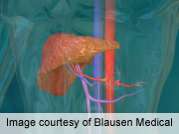(HealthDay)—Antifungal prophylaxis is associated with reductions in invasive fungal infections (IFIs) in liver transplant recipients, according to research published in the December issue of the American Journal of Transplantation.
J.D.W. Evans, from Cambridge University in the United Kingdom, and colleagues conducted a comprehensive literature search and identified randomized controlled trials comparing regimens for antifungal prophylaxis in liver transplant recipients. Data were included from 14 studies, with comparisons of fluconazole, liposomal amphotericin B (L-AmB), itraconazole, micafungin, and placebo.
The researchers found that the rate of proven IFI, suspected or proven IFI, and mortality due to IFI were reduced with antifungal prophylaxis (odds ratios, 0.37, 0.40, and 0.32, respectively) compared to placebo. There was no significant effect observed for all-cause mortality. No significant difference was seen in the risk of adverse events requiring cessation of prophylaxis (odds ratio, 1.11; 95 percent confidence interval, 0.48 to 2.55; P = 0.81). In the network meta-analysis, similar reductions were seen in the rate of IFI for fluconazole and L-AmB versus placebo (odds ratios, 0.21 and 0.21, respectively).
"Routine prophylaxis with fluconazole or L-AmB reduces the incidence of IFI following liver transplantation, and the available evidence suggests that the two are equivalent in efficacy," the authors write.
More information:
Abstract
Full Text (subscription or payment may be required)
Journal information: American Journal of Transplantation
Copyright © 2014 HealthDay. All rights reserved.





















